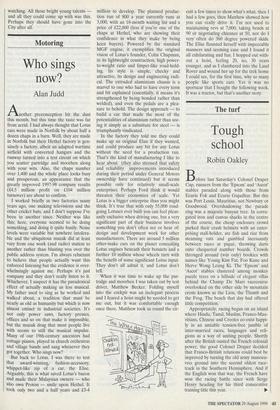Television
What's the point?
Marcus Berkmann
Twenty years ago it was politics, ten years ago it was journalism, but these days all the best and brightest young brains head straight for television light entertainment. The independent production companies of London's West End are surging with Oxbridge graduates, all wearing identical glasses with narrow frames and shaving their heads, whether they are going bald or not. And yet, despite this concentration of brain power, light ent. has rarely seemed so bereft of ideas. Most of the successful for- mats are years old, while most of the newer formats are merely variations of the suc- cessful ones. Everyone is searching, with increasing desperation, for light entertain- ment's Holy Grail: a programme that someone might possibly want to watch.
Nowhere is this absence more keenly felt than in ITV's Saturday-night schedules. The new autumn shows will follow in a week or two: a Cilla Black game show (if you lose she sings a song), a new run of You've Been Framed (hosted by the Fat Girl from Emmerdale), and Red Handed, in which 'members of the public play pranks on friends and family' (who never speak to them again). But before this glittering line- up is unveiled, ITV has been using the summer recess to experiment with a couple of pilots for possible future series. Last Sat- urday's Truth or Consequences was the first, and set a standard other shows will struggle to emulate.
The idea behind Truth or Consequences was simple enough: tell the truth or face the consequences. Steve Penk, a Capital `Col! Just ignore him. Why is it whenever we come to the beach you end up fighting?' Radio DJ, was the man with the micro- phone, shiny suit and unidentifiable region- al accent (all obligatory in these circumstances). As the titles rolled the stu- dio audience cheered wildly, unaware of the horrors that would shortly befall them. For this was another 'real people' show (cf. Confessions, Barrymore and 50,000 others) in which members of the public are ritually humiliated for the amusement of millions watching at home. People are afraid to go outdoors these days for fear of being mugged or raped or murdered, but a far more realistic threat to their well-being is posed by television light entertainment shows which want to make them look stupid. Mr Penk, who on radio has devel- oped a reputation as a japester, honed in on his victims with almost vampiric lust.
First up was a 'game' for a couple in the audience who 'know each other really well'. Not surprising, no one volunteered. 'Come on, Stevie isn't going to bite,' said Penk, with a vile leer. Eventually a deluded pair put their hands up. Jason and Karen claimed to know each other 'really, really well'. Penk outlined the challenge. Blind- folded and handcuffed, Jason would have to kiss four women and determine which one was Karen. The first was an actress from Coronation Street. The second (fol- lowing the ITC's strict guidelines on soap opera balance) was an actress from EastEn- ders. The third was Karen's Auntie Sheila (thus proving that this was a put-up job). The fourth was a chimpanzee. Karen's Auntie Sheila gave him what schoolchil- dren would identify as a tongue sandwich, on which criterion Jason identified her as his wife. Wrong, said Penk, when the blind- fold was removed. We didn't ask you to identify which one was your wife, we asked you to identify which one was Karen — and the chimpanzee's name, by a remarkable coincidence, was Karen. What larks!
All the games were a bit like this. People were extracted from the audience appar- ently randomly, but relatives or friends always seemed to turn up at some stage of their humiliation. One woman, asked to identify car parts (she worked in a garage), quickly spotted that they were parts of her own car. Penk then drew back a screen to reveal her car in bits on stage. He let her suffer for a few seconds, then admitted that it wasn't her car at all. It was another car they had pulled to bits to make it look like her car. All this occupied three minutes of screen time. What on earth was the point?
But then you could say this about the whole show. Vast effort had clearly been expended to dream up and execute these daft stunts. But there was no shape to the show, no obvious purpose, no real reason for it to exist. All that came over was the show's terrible desperation to make a splash. Lacking the slightest vestige of charm, it tried to compensate with sheer relentlessness. By the time it ended, I doubt if anyone other than paid television critics (and people named Penk) was watching. All those bright young talents and all they could come up with was this. Perhaps they should have gone into the City after all.



























































 Previous page
Previous page